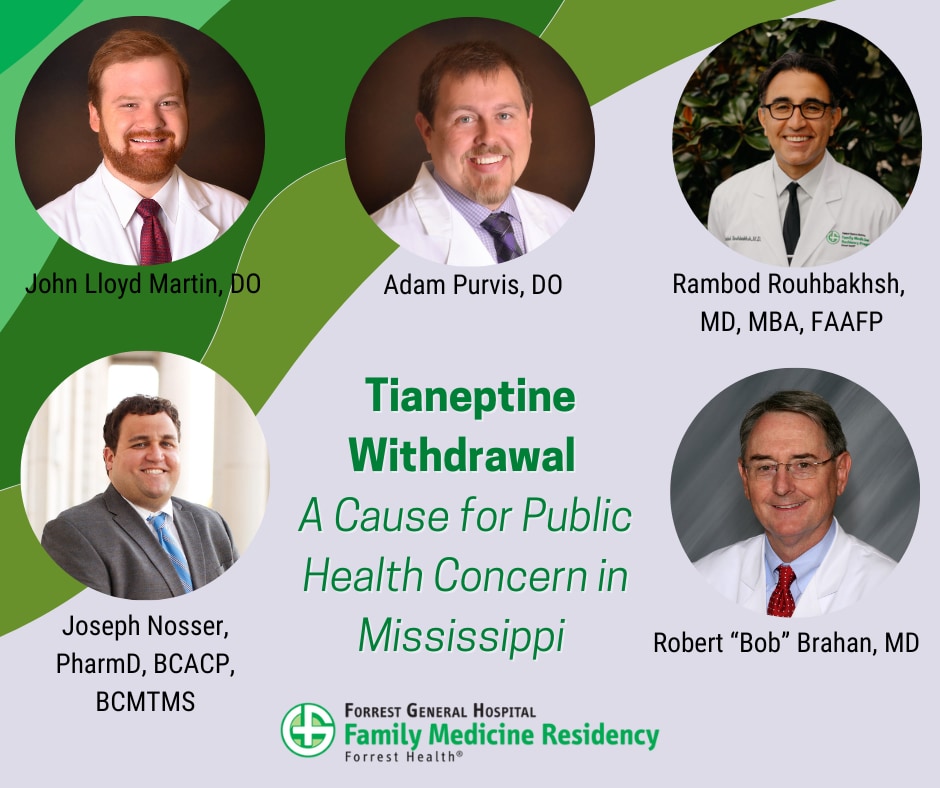Forrest Health’s Family Medicine Residency Program Research Plays Key Role in Passage of House Bill

HATTIESBURG, Miss. – (April 25, 2023) Playing a pivotal role in getting important legislation passed provides a feeling of accomplishment and great satisfaction, especially when you are helping to save the lives of others. Doctors with Forrest Health’s Family Medicine Residency Clinic (FMRC) are feeling just that.
During the recent session of the Mississippi Legislature, House Bill 4, an act to amend Section 41-29-117, Mississippi Code of 1972, to include tianeptine as a Schedule III drug; and for related purposes, was passed.
The bill, approved by Governor Tate Reeves on March 23, was signed into law based primarily on a published report by FMRC physician and residency program director, Rambod Rouhbakhsh, MD, MBA, FAAFP, and physicians, Joseph Nosser, PharmD, BCACP, BCMTMS, Robert “Bob” Brahan, MD, all Hattiesburg Clinic physicians, and John Lloyd Martin, DO, and Adam Purvis, DO, who were residents at the time but are now in practice.
“It makes us feel useful to our community that we were able to identify a public health threat, educate our colleagues about it, and then help eliminate it through legislation,” said Rouhbakhsh, “and all relatively quickly, as well.”
Nosser agrees. “We knew working with Forrest General and Hattiesburg Clinic they had the influence to get this information in front of the right people to advocate for what we had seen out on the front lines – local residents seeing the effects of tianeptine.”
“It’s been very interesting to see this grassroots effort come into play over a period of time,” he said. “We had two resident physicians seeing patients who presented with these same symptoms, so we worked together with the team to develop a study and report to the state what we found. From there, it started building momentum and getting in front of the right people. Our goal was to get this dangerous substance off the street.”
In January of 2022, two cases of tianeptine, also known as “gas station heroin,” withdrawal were observed by FMRC physicians. From March until May of 2022, the FMRC team developed a case series at which time they outlined findings from their tianeptine-withdrawal cases. From June through September of 2022, a manuscript, “Tianeptine Withdrawal: A Cause for Public Health Concern in Mississippi,” touting the dangers of tianeptine, underwent a peer review process with the Journal of the Mississippi State Medical Association before publication in the Journal of the Mississippi State Medical Association. The doctors’ findings were also presented to the Food and Drug Administration.
The principal authors and co-authors of House Bill 4 were Rep. Lee Yancey of District 74, and Rep. Dana McLean, District 39.
Nosser noted it is starting to come to light that tianeptine was a problem, and people were starting to talk about it. While it is currently still available, it’s just a matter of time. Some of these convenience stores that sell it are wanting to get ahead of the curve and are pulling it from their shelves now, while others will wait until June 30, 2023, the day before the new bill goes into effect. “We may see more patients between now and then until the product is no longer available,” Nosser said.
The patients, who presented to FMRC, exhibited opioid withdrawal symptoms while consuming high daily doses of tianeptine-based products.
According to Rouhbakhsh, these products have been marketed for various applications, including the self-treatment of anxiety, depression, asthma, and irritable bowel syndrome.
Mississippi becomes the seventh state to ban the tianeptine formulation behind Alabama, Michigan, Tennessee, Georgia, Indiana, and Ohio.
For more information, visit www.forresthealth.org or www.fda.gov.